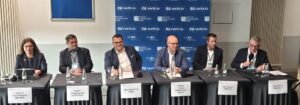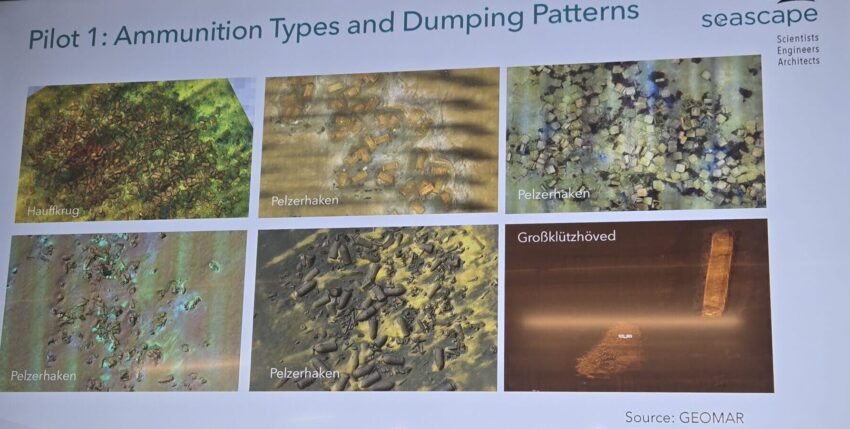Second Kiel Ammunition Clearance Week is open
Marine Protection Minister Tobias Goldschmidt:
"Schleswig-Holstein has been driving forward the recovery of old munitions for a long time. Science, environmental organisations and industry are working closely and well together. It is no coincidence that Kiel Munition Clearance Week was created here."
KIEL. This morning, Environment Minister Tobias Goldschmidt and initiator Jann Wendt (north.io) opened the second Kiel Munition Clearance Week. The conference will focus on the various possible solutions for removing underwater munitions and protecting critical infrastructure in the North and Baltic Seas. Over 250 experts from 16 countries have travelled to the conference - including representatives from the EU Commission, numerous federal and state authorities, NATO, the German Navy and international navies, industry, science and the environmental sector.
Schleswig-Holstein's leading role and demand for federal participation
Minister for Marine Protection Tobias Goldschmidt emphasised at the opening:
"We have been fighting for ten years for the issue of munitions waste to finally be taken seriously. I am delighted that even on the international stage, such as recently at the UN Ocean Conference in Nice, the generational task of clean-up is now being discussed with the necessary urgency. And the first statements from the new German government also give us hope that the current path will be continued."

Goldschmidt emphasised in this context:
"Schleswig-Holstein has shown in recent years that we can take responsibility and develop solutions. That is why it is clear to me that key parts of the planned federal competence centre must be located in Schleswig-Holstein. The expertise is available here. I expect the federal government to make binding commitments quickly now - we owe this to the people on our coasts."
Technological progress and international attention
KMCW25 impressively demonstrates how North German companies and research institutions are attracting global attention. New AI-supported mapping systems, autonomous underwater vehicles and data-orientated analysis platforms were presented - developments that are also attracting great interest from partners from NATO countries.
"We need these technological leaps in order to keep up with the pace of salvage. Schleswig-Holstein is a pioneer here," says Goldschmidt.

Legacy munitions as a European challenge
The EU Commission also increasingly views the topic as a European cross-cutting task, particularly in the context of the Green Deal and the resilience of critical maritime infrastructure. The KMCW is seen as a model for successful transnational cooperation.
"The demunition of our seas is a task that Europe must solve together. Events such as Kiel Munition Clearance Week show how it can be done," said an EU representative on the fringes of the conference.
Race against corrosion
Goldschmidt explains the significance of old munitions in German waters:
"Around 1.6 million tonnes of old war munitions need to be recovered from our seas. The longer it takes, the greater the damage. We are in a race against corrosion. The explosives they contain pose a growing risk to people and the environment. That is why this issue is also an integral part of the Baltic Sea Protection 2030 action plan."
Political will, the reality of financing - and another 900 years
Although there are commitments in the coalition agreement, there is still no concrete budgeting. Minister Goldschmidt admitted this. In addition, the observation: With a possible budget of 100 million euros, one cannot speak of political will! At this point, reference should be made to the failed toll project, for which over 243 million euros in damages were ultimately paid - and around 776 million euros were budgeted. A similar symbol of political will with regard to the safety of maritime areas has so far been missing.
In this respect, Kiel Munition Clearance Week 2025 is a good source of inspiration. It also consolidates Kiel's role as an international centre of excellence for maritime munitions clearance and the protection of critical underwater infrastructure, a topic that is becoming increasingly important in view of current geopolitical tensions and the increasing industrialisation of the seas. Even if it takes us another 900 years to recover the last shell from the German seabed if the current salvage rate is maintained.
Low federal presence and lack of state representation
Many participants in the dialogue were disappointed by the lack of interest at federal level. Representatives from several key ministries stayed away. According to one conference participant, greater visibility could have been expected from the German Navy. Not all of the German coastal states were represented either, although, like Schleswig-Holstein, they are responsible for cleaning up contaminated sites. A coordinated national approach has yet to be adopted - it would be a decisive and trend-setting signal now.
Public side event: MUNIMAR in dialogue
Last year, Schleswig-Holstein expertise from science, business and administration was already brought together in the MUNIMAR bundled. A public event will be held as part of Kiel Munition Clearance Week:
Thursday, 19.6.2025 / 19-21 h
Business Lounge, Wunderino Arena, Ziegelteich 30a, 24103 Kiel
Topic:
Communication about old munitions in the sea - challenges and opportunities
Citizens are cordially invited to inform themselves and join in the discussion.







